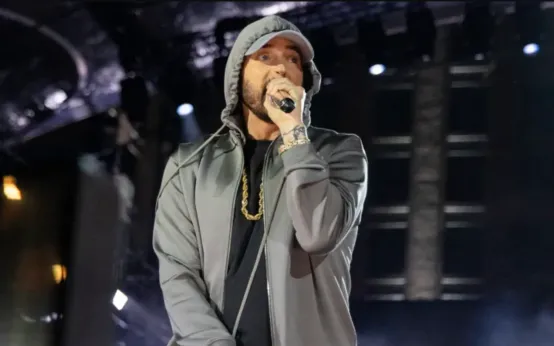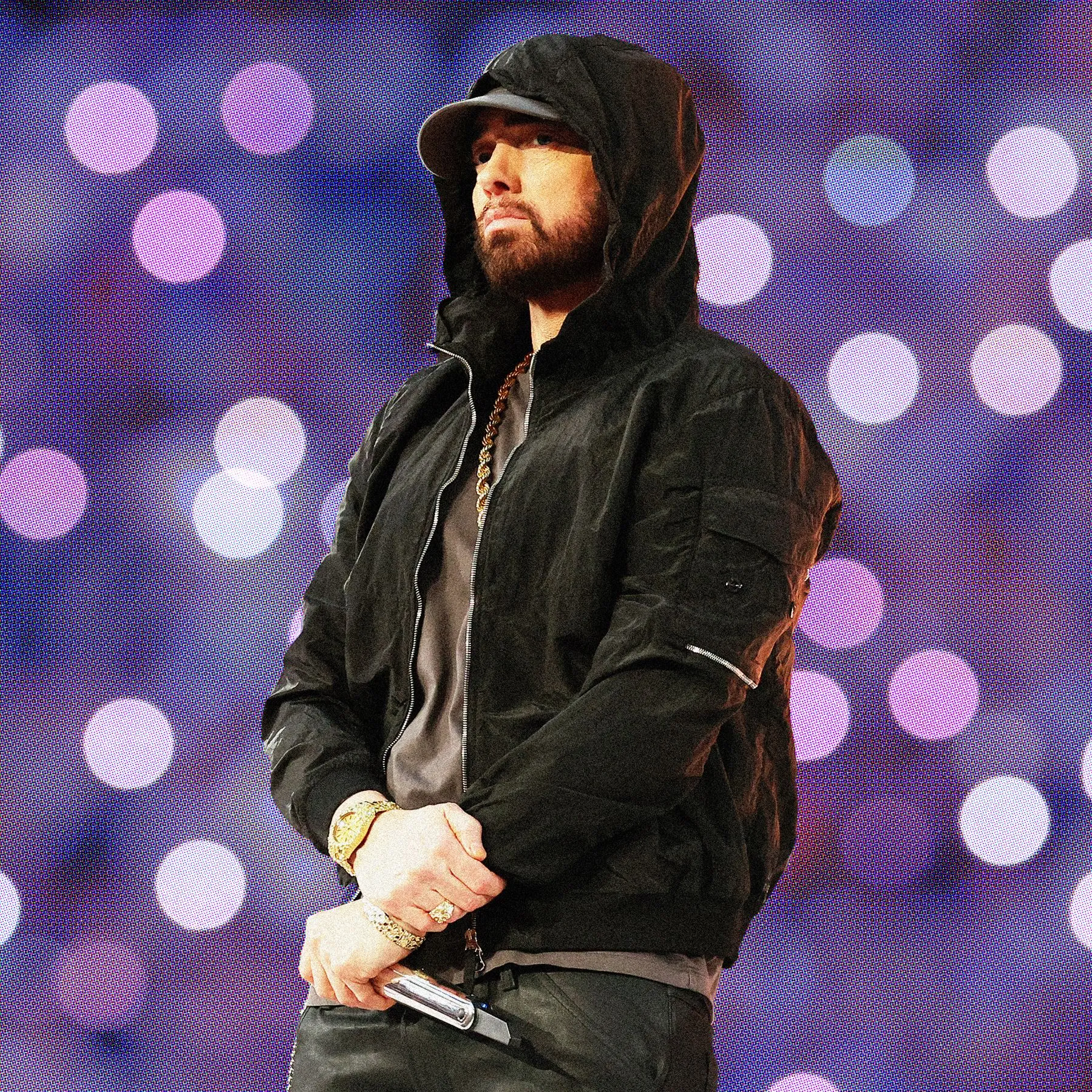

Eminem apologizes to his mother and explains why he no longer performs his infamous diss track
For more than two decades, Eminem has remained one of the most influential voices in hip-hop. Known for his sharp lyricism, raw honesty, and willingness to address deeply personal struggles, the Detroit rapper has built a career filled with both controversy and acclaim. Among his catalog of iconic songs, one track stands out as both a fan favorite and a source of lasting regret for the artist himself: “Cleanin’ Out My Closet.”
Originally released in 2002 on The Eminem Show, the track was a scathing diss aimed at his mother, Debbie Mathers. While it cemented Eminem’s reputation as an unflinching storyteller, the song also strained an already troubled family relationship. Years later, in 2013, the rapper issued a heartfelt public apology in his song “Headlights” from The Marshall Mathers LP 2. Since then, he has refused to perform the diss track live, calling it one of his biggest regrets.
This article takes a deep dive into the history of Eminem’s relationship with his mother, the impact of Cleanin’ Out My Closet, his public apology, and how the episode reflects his personal growth as both an artist and a man.
The Rise of Eminem and the Release of Cleanin’ Out My Closet
By 2002, Eminem had already achieved worldwide fame with The Slim Shady LP (1999) and The Marshall Mathers LP (2000). His rapid ascent in hip-hop was fueled by his fearless lyrical content and alter ego, Slim Shady, who often delivered controversial, confrontational, and darkly comedic bars.
When The Eminem Show dropped in 2002, fans expected more of the same, but they also received something deeply personal. On “Cleanin’ Out My Closet,” Eminem unleashed years of frustration toward his mother. The nearly five-minute song was filled with accusations, anger, and painful memories, portraying Debbie Mathers in a deeply negative light.
Key lyrics described his mother as selfish and destructive, even accusing her of drug use and emotional manipulation. Eminem went so far as to suggest he was a victim of Münchausen Syndrome by Proxy, a condition where a caregiver exaggerates or induces illness in someone under their care.
For fans, the song became one of Eminem’s most iconic works. It showcased the rawness that made his music so relatable. For Debbie Mathers, however, it was another public attack in an already tumultuous relationship with her son.
A Family Struggle Played Out in Public
The tension between Eminem and his mother was no secret. In 1999, Debbie Mathers sued her son for $10 million, accusing him of slander and defamation after he claimed in “My Name Is” that she “smokes more dope than I do.” The lawsuit was later settled for $25,000 in 2001, but the damage to their relationship was clear.
When Cleanin’ Out My Closet was released the following year, it only added fuel to the fire. Fans, critics, and media outlets dissected the song, and Debbie was forced once again into the spotlight.
Despite the negative attention, the track became one of Eminem’s most commercially successful singles, further embedding itself into the rapper’s legacy. Yet, behind the success was a son still wrestling with unresolved emotions about his upbringing.
The Turning Point: Headlights in 2013
More than a decade later, Eminem shocked fans when he released “Headlights” on The Marshall Mathers LP 2 in 2013. Far from another angry rant, this track was a vulnerable and emotional apology to his mother.
The song opened with the voice of fun.’s Nate Ruess singing:
“Mom, I know I let you down.”
From the very first line, listeners understood this was something different. Eminem acknowledged that his earlier music, particularly Cleanin’ Out My Closet, had been cruel and unfair. In his verses, he admitted that his mother bore the brunt of his anger and that he took things too far.
Some of the most striking lines included:
-
“But I’m sorry mama for ‘Cleanin’ Out My Closet’… that song I no longer play at shows and I cringe every time it’s on the radio.”
-
“You’re still beautiful to me, ’cause you’re my mom.”
For fans who had grown accustomed to Eminem’s biting disses, this song revealed a softer, more reflective side. It was a rare admission of regret, as well as a public acknowledgment of his mother’s role in his life, however flawed.
Why Eminem No Longer Performs Cleanin’ Out My Closet
Since the release of Headlights, Eminem has stopped performing “Cleanin’ Out My Closet” at concerts. For him, it represents a chapter of his life that he no longer wants to glorify.
He admitted that the song makes him uncomfortable now, especially when he hears it on the radio. While he once used music as a cathartic outlet to process anger and pain, Eminem has grown to realize the long-term consequences of his words — particularly when they involve family.
By refusing to perform the song, Eminem draws a clear line between the past and present. He acknowledges that while the track played a key role in shaping his career, it no longer reflects who he is today.
The Emotional Video for Headlights
The apology track was accompanied by a powerful music video directed by Spike Lee. The video dramatizes Eminem’s words, showing scenes from his mother’s perspective as she repeatedly tries to visit her son.
One of the most touching moments arrives at the end of the video, where Eminem and his mother finally embrace. Although the moment is symbolic rather than literal, it captures the essence of reconciliation and forgiveness that the song represents.
For many fans, the video provided closure — not only for Eminem’s complicated relationship with his mother but also for those who had followed the saga since the early 2000s.
Debbie Mathers’ Passing and Family Reflections
Debbie Mathers passed away on December 2, 2024, from complications related to lung cancer at the age of 69. Eminem’s younger brother, Nate, expressed his mixed emotions about their mother’s passing, noting both “hatred and mixed emotions” in his tribute.
While Eminem himself has not publicly commented in depth on her passing, his earlier apology in Headlights remains one of his most heartfelt artistic statements. It showed that, despite years of anger and estrangement, he ultimately wanted to make peace with his mother.
Eminem’s Growth as an Artist and a Person
Eminem’s decision to apologize through music highlights a broader theme in his career: evolution. Once seen as the ultimate provocateur of hip-hop, Eminem has gradually shifted toward introspection, maturity, and responsibility.
Where early albums thrived on shock value, later works like Recovery and The Marshall Mathers LP 2 showcased a man reflecting on his past, his mistakes, and his path forward. His apology to his mother wasn’t just about one song — it symbolized his willingness to confront his flaws openly.
This growth also explains why “Cleanin’ Out My Closet” no longer appears in his live shows. Instead, Eminem chooses to celebrate the resilience, forgiveness, and love that have defined his journey in later years.
Legacy of Cleanin’ Out My Closet and Headlights
Together, the two songs represent the arc of Eminem’s relationship with his mother — from anger and resentment to regret and reconciliation.
-
“Cleanin’ Out My Closet” remains one of his most recognizable songs, remembered for its raw energy and brutally honest lyrics.
-
“Headlights” stands as its counterpart, a song about healing, understanding, and forgiveness.
This duality is part of what makes Eminem such a compelling figure in hip-hop. He doesn’t shy away from his mistakes but instead uses his platform to process them in real time, inviting listeners along for the ride.
Final Thoughts
Eminem’s decision to publicly apologize to his mother through “Headlights” and retire “Cleanin’ Out My Closet” from his performances is a testament to his personal and artistic evolution. What began as one of the harshest diss tracks in hip-hop history ultimately transformed into a story of forgiveness and growth.
As fans reflect on his career, this chapter stands as a reminder that even the most outspoken artists can change, learn, and heal. Eminem may have once defined himself by anger, but his apology shows that, in the end, love and reconciliation hold far greater power.




















